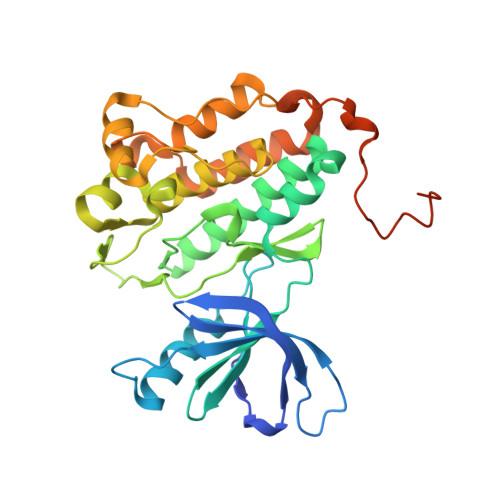Discovery of 1-{(3R,4R)-3-[({5-Chloro-2-[(1-methyl-1H-pyrazol-4-yl)amino]-7H-pyrrolo[2,3-d]pyrimidin-4-yl}oxy)methyl]-4-methoxypyrrolidin-1-yl}prop-2-en-1-one (PF-06459988), a Potent, WT Sparing, Irreversible Inhibitor of T790M-Containing EGFR Mutants.
Cheng, H., Nair, S.K., Murray, B.W., Almaden, C., Bailey, S., Baxi, S., Behenna, D., Cho-Schultz, S., Dalvie, D., Dinh, D.M., Edwards, M.P., Feng, J.L., Ferre, R.A., Gajiwala, K.S., Hemkens, M.D., Jackson-Fisher, A., Jalaie, M., Johnson, T.O., Kania, R.S., Kephart, S., Lafontaine, J., Lunney, B., Liu, K.K., Liu, Z., Matthews, J., Nagata, A., Niessen, S., Ornelas, M.A., Orr, S.T., Pairish, M., Planken, S., Ren, S., Richter, D., Ryan, K., Sach, N., Shen, H., Smeal, T., Solowiej, J., Sutton, S., Tran, K., Tseng, E., Vernier, W., Walls, M., Wang, S., Weinrich, S.L., Xin, S., Xu, H., Yin, M.J., Zientek, M., Zhou, R., Kath, J.C.(2016) J Med Chem 59: 2005-2024
- PubMed: 26756222
- DOI: https://doi.org/10.1021/acs.jmedchem.5b01633
- Primary Citation of Related Structures:
5HG5, 5HG7, 5HG8, 5HG9 - PubMed Abstract:
First generation EGFR TKIs (gefitinib, erlotinib) provide significant clinical benefit for NSCLC cancer patients with oncogenic EGFR mutations. Ultimately, these patients' disease progresses, often driven by a second-site mutation in the EGFR kinase domain (T790M). Another liability of the first generation drugs is severe adverse events driven by inhibition of WT EGFR. As such, our goal was to develop a highly potent irreversible inhibitor with the largest selectivity ratio between the drug-resistant double mutants (L858R/T790M, Del/T790M) and WT EGFR. A unique approach to develop covalent inhibitors, optimization of reversible binding affinity, served as a cornerstone of this effort. PF-06459988 was discovered as a novel, third generation irreversible inhibitor, which demonstrates (i) high potency and specificity to the T790M-containing double mutant EGFRs, (ii) minimal intrinsic chemical reactivity of the electrophilic warhead, (iii) greatly reduced proteome reactivity relative to earlier irreversible EGFR inhibitors, and (iv) minimal activity against WT EGFR.
Organizational Affiliation:
La Jolla Laboratories, Pfizer Worldwide Research and Development , 10770 Science Center Drive, San Diego, California 92121, United States.

















